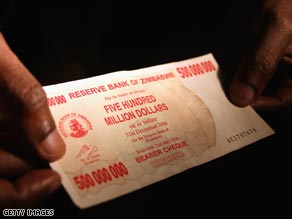Yeah, I have no experience of hyperinflation, so don't know how it works in practice. I think that if you work on a market stall and at every price level, your stock clears a lot sooner than you would otherwise expect it to (massive demand), you would keep increasing the price to find the biting point. Otherwise, the money you receive for your goods will not equal the real value that they are worth. It must be guess work, but I think that if prices around you are increasing, then you must raise your own prices or you won't be able to afford to buy anything.
Apparently in
Hungary after WWII, prices increased 19,000 percent a month! Also, check
this out for unintended consequences.
Re inflation as a tax -- it's not a direct tax, but it does have beneficiaries (net debtors, like the government) and and those who have to pay for government debt relief (anyone holding cash, like most people). There is also the issue of marginal tax rates, where inflation pushes nominal wages higher, placing workers in higher tax brackets despite the fact that real wages have not increased.
Inflation is not inevitable but it is highly likely in a system of fiat currency. Inflation under the
historical gold standard was pretty consistently low for a long ass time.


